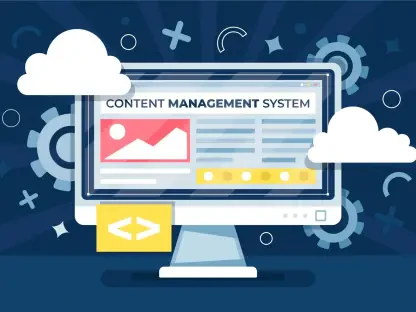Understanding the SMB Marketing Landscape
Small and medium-sized businesses (SMBs) face a daunting uphill battle in the digital marketing realm, with a staggering 73% struggling to maintain consistent brand messaging across platforms due to tight budgets and limited in-house expertise. These enterprises often operate with constrained resources, lacking the financial muscle to hire dedicated marketing teams or invest in premium tools that larger corporations take for granted. This gap creates a persistent challenge in crafting impactful campaigns that resonate with target audiences while staying competitive in an increasingly crowded online space.
Technology has become a critical lifeline for SMBs, reshaping how they approach marketing strategies with accessible solutions. Tools from key market players like Canva and Adobe have provided some relief by offering user-friendly design platforms, yet the learning curve and subscription costs can still pose barriers. The rise of AI-driven tools marks a significant shift, promising to automate complex tasks and deliver cost-effective results, setting the stage for innovations that could fundamentally alter the playing field for smaller businesses aiming to establish a strong digital presence.
The importance of consistent branding cannot be overstated, as it builds trust and recognition among consumers. For SMBs, achieving this consistency without substantial resources remains a hurdle, often leading to fragmented messaging that dilutes their identity. As AI technology continues to penetrate the marketing sector, it offers a potential solution by streamlining processes and ensuring alignment with brand values, a development that many industry observers see as pivotal for SMB growth in the current landscape.
Unveiling Google’s Pomelli AI: A Game-Changer for SMBs
Key Features and Innovations
Google’s Pomelli AI, an experimental tool launched through Google Labs in collaboration with DeepMind, introduces a novel approach to digital marketing by analyzing a business’s website to extract its unique “Business DNA.” This encompasses tone of voice, visual elements such as fonts and color schemes, and overall brand identity, enabling the creation of customized marketing assets like social media posts, advertisements, and email campaigns. Such functionality aims to simplify content creation for SMBs that often lack the means for bespoke design work.
What sets Pomelli apart from generic content generators is its integration of advanced DeepMind AI technology, which prioritizes brand consistency and relevance in every output. By constructing a detailed profile of a business’s online presence, the tool ensures that generated materials align closely with the company’s ethos and aesthetic, reducing the risk of off-brand content. This precision offers a marked advantage over traditional tools that may produce disconnected or irrelevant results.
Additionally, Pomelli’s user-friendly interface allows for rapid production of editable assets, empowering businesses to tweak outputs to fit specific needs. This flexibility addresses a common concern among SMBs about losing control over their creative direction when using automated solutions. The tool’s design reflects a deep understanding of the need for both efficiency and personalization in modern marketing efforts.
Market Impact and Adoption Trends
The impact of Pomelli on the SMB sector is already evident, particularly in addressing long-standing challenges like brand messaging consistency, which affects a reported 73% of small businesses. By automating the alignment of content with a company’s identity, the tool tackles this pain point head-on, offering a practical solution where manual efforts often fall short. Early data suggests a promising reception, with initial feedback highlighting its role in streamlining campaign development.
Feedback from early adopters indicates a significant boost in efficiency, with ideation times reduced by 30 to 50%, allowing for quicker testing and iteration of marketing strategies. This speed is crucial in a fast-paced digital environment where agility can make or break a campaign’s success. Such results point to Pomelli’s potential to redefine how SMBs manage their marketing workflows under resource constraints.
Looking ahead, industry projections estimate marketing automation spending to reach $25.1 billion by 2030, signaling a robust growth trajectory that positions Pomelli as a timely disruptor. As a free beta tool, it challenges established players with paid models, potentially reshaping market dynamics. Its strategic entry into this expanding sector underscores Google’s intent to democratize access to high-quality marketing solutions for smaller enterprises.
Challenges in Implementing Pomelli AI for SMBs
The widespread adoption of AI tools like Pomelli brings with it the risk of creative homogenization, where unique brand voices might be overshadowed by standardized outputs. As more businesses rely on similar algorithms, there’s a concern that distinctive identities could blur, reducing the individuality that often defines SMBs. This potential downside necessitates a careful balance between automation and originality to preserve competitive differentiation.
Technical challenges also loom large, particularly in ensuring that customization options cater to the diverse needs of SMBs across various industries. Not every business fits a one-size-fits-all model, and Google must address this by refining Pomelli to accommodate niche requirements without compromising ease of use. Ongoing beta testing appears focused on gathering user input to enhance these aspects, aiming for broader applicability.
To mitigate these issues, Google emphasizes human oversight through editable outputs, allowing businesses to adjust AI-generated content to reflect their vision. This approach seeks to maintain a personal touch in marketing efforts, ensuring that automation serves as a supportive tool rather than a complete replacement for creative input. Such strategies are vital for sustaining trust and relevance among users navigating the complexities of AI integration.
Navigating the Regulatory and Ethical Landscape
As AI tools like Pomelli analyze website data to extract “Business DNA,” regulatory considerations around data privacy come to the forefront. The process of scraping and interpreting online content raises questions about consent and the security of sensitive information, especially for SMBs unfamiliar with compliance requirements. These concerns are amplified in regions with stringent data protection laws that could influence tool deployment.
Google has taken steps during Pomelli’s beta phase to address these issues by implementing robust security measures and transparency protocols. Ensuring compliance with global privacy standards is a priority, as any misstep could undermine user trust and hinder adoption. The company’s proactive stance aims to build confidence among SMBs wary of potential legal pitfalls associated with AI-driven marketing.
Beyond privacy, ethical implications of AI in marketing include the responsible use of automated content to avoid misleading representations. Striking a balance between innovation and accountability remains a key focus, as regulatory frameworks continue to evolve in response to technological advancements. Google’s approach during this initial rollout will likely set a precedent for how similar tools navigate these complex waters in the future.
The Future of SMB Marketing with Pomelli AI
Pomelli’s trajectory suggests a potential for global expansion beyond its current availability in the United States, Canada, Australia, and New Zealand. A phased rollout allows Google to refine the tool based on regional feedback, paving the way for adaptation to diverse markets with varying cultural and business needs. This cautious strategy could amplify its impact on a worldwide scale over the coming years.
Emerging trends in marketing technology, such as the growing demand for no-code solutions, align closely with Pomelli’s design philosophy. SMBs increasingly seek accessible platforms that require minimal technical expertise, and this tool fits squarely within that paradigm. Its influence may extend to shaping pricing models across the industry, pushing competitors toward more affordable or free offerings to remain relevant.
Economic and technological shifts will also play a role in how Pomelli evolves, particularly as SMBs navigate fluctuating budgets and digital expectations. The tool’s ability to offer scalable, cost-effective solutions positions it as a catalyst for change, potentially lowering barriers to entry for businesses in underserved regions. Industry watchers anticipate that such innovations could redefine accessibility standards, fostering a more inclusive marketing ecosystem by 2027.
Conclusion: The Path Forward for SMBs with Pomelli AI
Reflecting on the insights gathered, it becomes clear that Pomelli AI carves a transformative niche for SMBs by enhancing efficiency, ensuring brand consistency, and improving accessibility to professional-grade marketing tools. The journey through its beta phase highlights a significant stride toward addressing long-standing resource constraints that plague smaller enterprises in their digital endeavors.
Moving forward, SMBs are encouraged to embrace such AI-driven solutions while maintaining a vigilant eye on balancing automation with authentic creative input to preserve their unique identities. A strategic approach that integrates Pomelli’s capabilities with periodic human review stands as a recommended path to maximize benefits without sacrificing originality.
As the marketing technology landscape continues to shift, stakeholders need to prioritize adaptability, staying informed about regulatory updates and ethical considerations that accompany AI adoption. By fostering collaboration between technology providers and businesses, a foundation is laid for sustained growth, ensuring that tools like Pomelli not only meet immediate needs but also anticipate future challenges in an ever-evolving digital arena.









